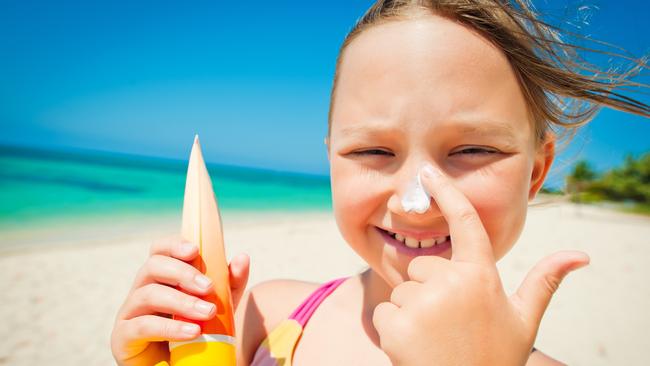Neutrogena sunscreen product recalled after cancer linked ingredient found
A cancer causing chemical has been found in a leading sunscreen prompting the manufacturer to recall the product in Australia.
National
Don't miss out on the headlines from National. Followed categories will be added to My News.
It’s meant to prevent skin cancer but a leading brand of sunscreen has been removed from shop shelves because it has been found to contain the cancer causing chemical benzene.
Pharmaceutical company Johnson & Johnson Pacific Pty Ltd has recalled all batches of Neutrogena Ultra Sheer Body Mist Sunscreen Spray SPF 50+ (aerosol sunscreen), because benzene has been detected in some batches supplied in Australia.
“All batches with an expiry date of 30th August 2023 or earlier should not be used due to possible health risks linked to benzene,” the nation’s medicines watchdog the Therapeutic Goods Administration (TGA) said in a statement on its website.
The withdrawal of the product comes after News Corp reported in June nearly 80 brands of sunscreen had been found to contain the cancer causing chemical.
Valisure, a US company that chemically tests generic medicines to check whether they contain contaminants found 78 sunscreen brands contained the chemical including Neutrogena and Banana Boat.

The TGA has asked the public to discard any Neutrogena sunscreen spray they have at home and visit the www.neutrogena.com.au website to request a refund.
Benzene is classified as a human carcinogen, a substance that could potentially cause cancer and the TGA requires it must be below a concentration of 2 parts per million in medicines.
Johnson & Johnson testing detected benzene at concentrations less than 3 ppm in 2 of the 17 batches supplied in Australia, the TGA said.
The chemical is not a listed ingredient of sunscreen but is sometimes used in medicine manufacturing processes.
The TGA said “exposure to benzene in this sunscreen product, at the levels detected, would not be expected to cause serious adverse health effects”.
However to reduce the risk to consumers, Johnson & Johnson is recalling all batches of the affected product supplied within Australia.
The sunscreen cancer risk came to light earlier this year when Valisure uncovered the problem after testing 294 sunscreens made by 69 companies.
Fourteen batches contained benzene at concentrations up to three times the limit of two parts per million set by Australia’s medicines watchdog, the Therapeutic Goods Administration (TGA), and the US Food and Drug Administration (FDA).
The rest contained benzene at levels of 0.1 to 1.9 parts per million.
Among the 78 sunscreen brands found to have the chemical were Neutrogena and Banana Boat.
In March, Valisure also found benzene in multiple batches of hand sanitiser.
The World Health Organisation, and the International Agency for Research on Cancer have classified benzene as “carcinogenic to humans”.
There is evidence it can cause acute myeloid leukaemia (AML) and it has also been linked with acute lymphocytic leukaemia (ALL), chronic lymphocytic leukaemia (CLL), multiple myeloma, and non-Hodgkin lymphoma.
Valisure has written to the US FDA to recall the products and check on how they are manufactured.
“The presence of this known human carcinogen in sunscreen products widely recommended for the prevention of skin cancer and regularly used by adults and children in large volumes makes this finding especially troubling,” the company said in a letter to the regulator.
Earlier this year Johnson and Johnson told News Corp “nothing is more important than the health and safety of the people who use our products.
“Benzene is not an ingredient in any of our personal care products and we are reviewing the findings presented in this petition.
“Every ingredient we use in our products is carefully selected to ensure safety and performance in line with our rigorous five-step safety assurance process.
“We are committed to making high-quality, safe and effective sunscreens available to consumer.”

In June the TGA said benzene was not included in the list of pre-approved, low-risk ingredients permitted for use in listed medicines, which include sunscreens.
However, it said its regular safety reviews had not tested sunscreen products for the chemical.
Back in June Chairman of the Board of the Skin and Cancer Foundation Australia Associate Professor Stephen Shumack said the testing was on US products and at this point there was no evidence of any issues with sunscreens in Australia.
“I don’t think we can extrapolate because we do have actually have different sunscreen and a quite different sunscreen standard,” he said.
While the situation required further investigation people should continue to use sunscreen, the dermatologist said.
Chair of the Cancer Council’s Skin Cancer Committee Paige Preston said sunscreens sold in Australia were approved by the Therapeutic Goods Administration.
“There isn’t any evidence to suggest that sunscreens approved for use in Australia cause cancer, but we do know that around 2000 Australians die of skin cancer each year,” she said.
Professor Ian Rae, an expert on chemicals in the environment at the School of Chemistry at the University of Melbourne, said benzene was used in petrol and we were commonly exposed to small amounts.
“But putting it on the skin is a bit different from just a passing whiff of it as it goes by, that’s why there are limits put on it,” said Prof Rae, the former President of the Royal Australian Chemical Institute.
Benzene is a solvent and its presence in sunscreen was probably the result of the manufacturing process, he said.



